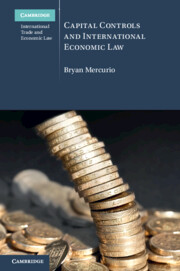Book contents
- Capital Controls and International Economic Law
- Cambridge International Trade and Economic Law
- Capital Controls and International Economic Law
- Copyright page
- Contents
- Foreword
- Preface
- Acknowledgements
- Abbreviations
- Part I Key Concepts: Capital Flows and Controls
- Part II The IMF, Capital Flows and Controls
- 3 Shifting the IMF Mandate
- 4 The Legality of the IMF’s Mandate Expansion
- Part III Legal Frameworks, Rules and Conflicts
- Bibliography
- Index
4 - The Legality of the IMF’s Mandate Expansion
from Part II - The IMF, Capital Flows and Controls
Published online by Cambridge University Press: 18 May 2023
- Capital Controls and International Economic Law
- Cambridge International Trade and Economic Law
- Capital Controls and International Economic Law
- Copyright page
- Contents
- Foreword
- Preface
- Acknowledgements
- Abbreviations
- Part I Key Concepts: Capital Flows and Controls
- Part II The IMF, Capital Flows and Controls
- 3 Shifting the IMF Mandate
- 4 The Legality of the IMF’s Mandate Expansion
- Part III Legal Frameworks, Rules and Conflicts
- Bibliography
- Index
Summary
This chapter explores the legality of the IMF’s shift in mandate, and considers the overarching question of whether the institution was legally entitled to expand its mandate over time through de facto legal doctrines rather than express or implied consent of the members. The analysis begins with a consideration of the legal basis of the Fund’s initiative by examining the international legal theory on the legal personality of international organisations. That is, whether the mandate of an international organization is strictly dependant on the wording of its constitutive instrument(s), or whether the mandate can evolve so as to accommodate new de facto attributions and competences. The Fund’s mandate shift is then tested by taking into account the power of soft law. A key aspect in the legal literature is whether the constituent doctrine of ‘separate will’ or ‘volonté distincte’, which allows an organisation to act independently – that is without the express or implied consent of members – would apply to the mandate expansion as the move ensured the Fund maintained relevancy in an ever-changing world. Finally, the chapter concludes that the Fund’s mandate expansion was in line with the standards of international law applicable to international organisations.
Keywords
- Type
- Chapter
- Information
- Capital Controls and International Economic Law , pp. 76 - 92Publisher: Cambridge University PressPrint publication year: 2023

